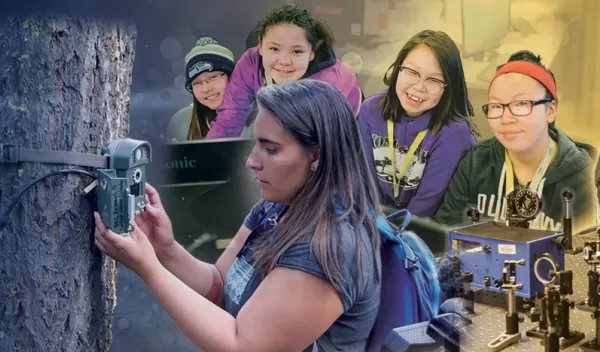
NSF announces $24M investment across three EPSCoR jurisdictions
The U.S. National Science Foundation has awarded teams from South Dakota, New Hampshire and Maine roughly $8 million each through the Established Program to Stimulate Competitive Research (EPSCoR) Collaborations for Optimizing Research Ecosystems Research Infrastructure Improvement Program (E-CORE RII) to enhance their state's research and development competitiveness and promote scientific progress nationwide.
Established in response to the 2022 study of EPSCoR, the Envisioning the Future of NSF EPSCoR report and the "CHIPS and Science Act of 2022," E-CORE RII is a new program that aims to further EPSCoR's programmatic goals by building capacity in one or more targeted research infrastructure cores within an EPSCoR-eligible jurisdiction's research ecosystem.
"By boosting their state's R&D capabilities, these teams are poised to drive use-inspired research and transform STEM education and workforce development within their regions," said NSF Director Sethuraman Panchanathan. "This investment from NSF's E-CORE RII program underscores our commitment to advancing research and building robust research infrastructure hubs, fostering innovation ecosystems and creating pathways for economic growth and societal impact."
Over the next four years, the teams — comprised of diverse academic institutions and government, industry and nonprofit partners — will leverage their partnerships to meet core research infrastructure needs to develop self-sustaining research ecosystems and create pathways to science, technology, engineering and mathematics and spur economic growth and societal impact.
The awardees and a summary of each project are listed below:
Led by Black Hills State University, this project will meet the challenge of creating pathways for young learners to develop interest and confidence in STEM and become motivated to work in STEM fields across the largely rural jurisdiction of South Dakota. The project aims to engage STEM researchers and K-12 teachers and students to create a pipeline of the next generation of the South Dakota STEM workforce that could become a national model for connecting individuals that are geographically isolated to STEM education at the pre-college level.
Collaborating institutions: Oglala Lakota College, the University of South Dakota, the South Dakota School of Mines and Technology, Dakota State University, South Dakota State University, the Augustana University Association, Northern State University, Sinte Gleska University, Sisseton Wahpeton College, the Sanford Underground Research Facility/South Dakota Science and Technology Authority, and the South Dakota Discovery Center.
New Hampshire - New Hampshire Long-term Investment to Fuel Transformative research (NH-LIFT)
The NH-LIFT project, spearheaded by the University of New Hampshire, aims to develop a network that includes representatives from all 17 colleges and universities in the state and work with the NSF Small Business Innovation Research/Small Business Technology Transfer program to develop relationships between academia and businesses. The goals of NH-LIFT are to procure new research opportunities at partner institutions; develop and strengthen educational and research collaborations with regional industry partners; share institutional best practices to recruit, empower and retain a broad and diverse group of students in STEM fields; and build a cohort of project alumni that will support near-peer mentoring and recruitment.
Collaborating institutions: Keene State College, Dartmouth College, Plymouth State University, New England College, Saint Anselm College and the Community College System of New Hampshire.
Led by the University of Maine, the Maine-SMART project will take a comprehensive approach to addressing both scientific and cultural needs within the state. By leveraging partnerships with diverse institutions and organizations, the project has the potential to foster systemic changes in collaboration, education and workforce development, aligning closely with Maine's science and technology plan. The project integrates Indigenous science and sociocultural learning theory into research and educational practices, thus offering innovative solutions to complex problems while promoting inclusivity and belonging among tribal members in STEM.
Collaborating institutions: The Gulf of Maine Research Institute, the Maine Mathematics and Science Alliance, the University of Southern Maine, the Maine Community College System and the University of Maine at Fort Kent.
